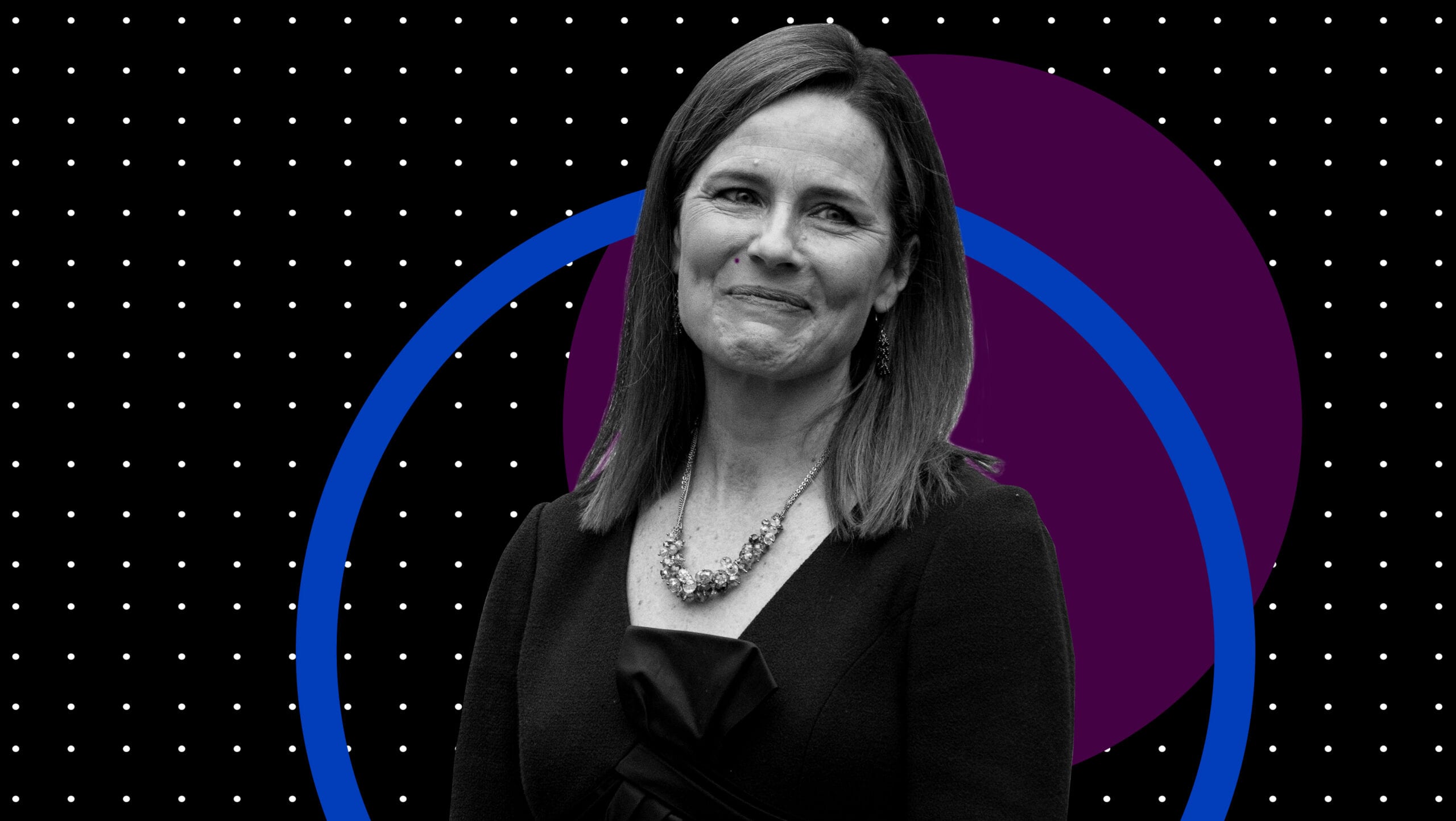Shortly after the death of long-standing Justice Ruth Bader Ginsburg on Sept. 26, President Donald Trump nominated the young, relatively unknown Amy Coney Barrett to the newly vacant Supreme Court seat. A favourite among social conservatives, Barrett’s quick nomination generated resistance amid some liberals and leftists, who opined that the seat should be left empty until after the fall election. Nonetheless, Barrett’s confirmation hearings will begin on Oct.12. Because of the Republican majority in the Senate, it seems likely that Barrett will be appointed.
Here’s everything you need to know about Amy Coney Barrett.
She’s a relatively green judge
What Barrett’s nomination means for LGBTQ2 people isn’t entirely clear. The 48-year-old judge is a proponent of the legal school of originalism, meaning that she believes in applying the original logic and intentions of the Constitution to the situation at hand, rather than prioritizing more modern interpretations. This could present difficulties for a queer community whose existences were not considered in 1787, but to what extent is unclear.
Due to her relative youth and inexperience as a judge, there haven’t been sufficient opportunities for Barrett’s legal opinions and style to truly shine. But advocacy and humanitarian organizations have raised alarm over Barrett’s personal views, many of which arise from her conservative Roman Catholic faith, as well as opinions she has expressed at various speaking engagements. (If appointed, Barrett would be the sixth Catholic Supreme Court justice.)
A 2016 lecture raised red flags for LGBTQ2 folks and allies
Much of the material that’s ringing alarm bells against Barrett is from a lecture she gave at Jacksonville University in 2016. Speaking to law students, Barrett defended the stance of dissenters in Obergefell v. Hodges, the landmark Supreme Court ruling that affirmed the legality of same-sex marriage. She empathized with dissenter Chief Justice John Roberts, whose opinion was that it wasn’t for the courts to decide whether or not same-sex marriage should be legal. “I think [with] Obergefell, what we’re talking about for the future of the court [is] really a who decides question,” Barrett theorized in the lecture.
In that same Jacksonville University lecture, Barrett also opines that Title IX protections do not extend to transgender Americans. Title IX is a federal civil rights law passed in 1972, which states that educational programs or activities that receive federal funding cannot exclude from participation or discriminate against anyone on the basis of their sex. During his presidency, Barack Obama explicitly issued clarification on Title IX rights that extended the law to include discrimination on the basis of gender identity.
In keeping with her originalist approach, Barrett has argued that this extension strains the original intention of the statute. “When Title IX was enacted, it’s pretty clear that no one would have dreamed of that result at that time,” she argues during the lecture. “It does seem to strain the text of the statute to say that Title IX demands it.” Barrett goes on to refer to trans women as “physiological males who identify as females,” and says that “people feel passionately on whether they should be permitted in bathrooms, especially where there are young girls present.”
Barrett is also associated with an anti-gay legal fellowship
Also cause for alarm is Barrett’s association with the Blackstone Legal Fellowship, a summer program run by the Alliance Defending Freedom (ADF). The fellowship intends to bring a Christian worldview into America’s legal institutions; the founding leader of its parent organization has been known to call into question the separation of church and state. ADF is best known for representing and winning the court case involving a Colorado baker who refused to make a cake for a gay couple’s wedding reception.
Barrett was a paid speaker at the Blackstone Legal Fellowship five different times between 2011 and 2017, but has claimed she was unaware that the fellowship was run by ADF while she was speaking there. Barrett has also pleaded ignorance to the ADF’s policy positions, including their fervent opposition of same-sex marriage.
Suggested reading lists for the fellowship have previously included texts such as “The Homosexual Agenda,” which argues that gay relationships lead to despair, disease and early death, as well as a text that refers to homosexuality as a “dark pagan practice.” A text that remains on the reading list claims that homosexuals remaining in the closet “is a sign of a sane society.”
Barrett signed an anti-gay letter to Catholic bishops
The final sign that Barrett may harbour anti-queer prejudice is a letter addressed to Catholic bishops in 2015. Barrett signed it along with a group of 1,374 Catholic women in anticipation of the Fourteenth Ordinary General Assembly of the Synod of Bishops, which took place in October of that year. These assemblies are meant to formulate pastoral guidelines, and that meeting was called specifically to discuss the matter of the family.
In the letter, which describes women as having “preferential attention for the family,” the signatories affirmed the Church’s teachings on the complementary sexual difference of men and women, and that marriage and the family are “founded on the indissoluble commitment of a man and a woman.”
LGBTQ2 organizations do not support her nomination
The Human Rights Campaign (HRC) has firmly and explicitly opposed Barrett’s nomination to the Supreme Court, noting that her nomination has the potential to do damage to reproductive, LGBTQ2 and civil rights. “Her hostility towards many of society’s most marginalized, victimized and vulnerable groups raises serious concerns about her ability to be impartial and fairly consider the rights of all who come before the Court, including LGBTQ people,” a letter from the organization reads.
On the other hand, notorious anti-gay figure Brian Brown, head of the National Organization for Marriage, has backed Barrett. In a mass email, Brown urged followers to support Barrett, seeing in her an opportunity to roll back rights granted to LGBTQ2 Americans.
She claims she’ll remain impartial as a Supreme Court justice
In response to such stances, Barrett has repeatedly stated her opinion that her Catholic worldview bears no influence on her legal opinions. During her confirmation hearing to the 7th Circuit Court of Appeals in 2017, she was confronted about her socially conservative Catholic opinions. Her response was that she would be impartial as a judge, and would not impose any personal opinions onto the law.
It’s difficult to qualify these statements due to a lack of clear proof. Since her 2017 confirmation Barrett’s written just over 100 opinions. During this time, she has encountered cases related to abortion laws three times. In all three encounters, she joined opinions that voted to grant rehearings to laws that would restrict access to abortion in her homestate of Indiana. Her support for these opinions is inseparable from her anti-abortion Catholic perspective, begging the question: What happens when she encounters LGBTQ2 cases?
The Supreme Court has been an important institution for the furthering of LGBTQ2 rights, in recent years ruling to extend marriage equality and to protect queer and trans Americans from employment discrimination. In the future, the Supreme Court will continue to rule on potentially landmark cases significant for the queer community. Among these cases is Fulton v. City of Philadelphia, which will decide whether taxpayer-funded childcare agencies have a constitutional right to discriminate against same-sex families.


 Why you can trust Xtra
Why you can trust Xtra


